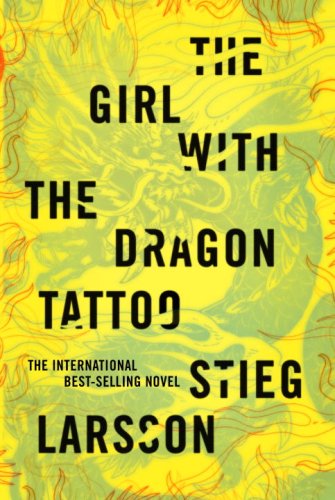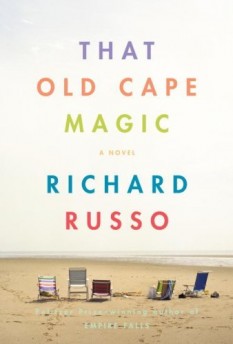- July 7, 11 a.m.
- Discussion Leader: Ellen Getreu
Summary (from the Doubleday web site)
The first novel in Stieg Larsson’s internationally best-selling Millennium trilogy.
It’s about the disappearance forty years ago of Harriet Vanger, a young scion of one of the wealthiest families in Sweden . . . and about her octogenarian uncle, determined to know the truth about what he believes was her murder.
It’s about Mikael Blomkvist, a crusading journalist recently at the wrong end of a libel case, hired to get to the bottom of Harriet’s disappearance . . . and about Lisbeth Salander, a twenty-four-year-old pierced and tattooed genius hacker possessed of the hard-earned wisdom of someone twice her age—and a terrifying capacity for ruthlessness to go with it—who assists Blomkvist with the investigation. This unlikely team discovers a vein of nearly unfathomable iniquity running through the Vanger family, astonishing corruption in the highest echelons of Swedish industrialism—and an unexpected connection between themselves.
It’s a contagiously exciting, stunningly intelligent novel about society at its most hidden, and about the intimate lives of a brilliantly realized cast of characters, all of them forced to face the darker aspects of their world and of their own lives. (From the publisher.)
Booklist Review The first U.S. appearance of another major Swedish crime writer is cause for celebration but also disappointment: Larsson, an acclaimed journalist as well as the author of the award-winning Millenium trilogy, of which this is the first volume, died in 2004. The editor of a magazine called Expo, which was dedicated to fighting right-wing extremism, Larsson brings his journalistic background to bear in his first novel. It is the story of a crusading reporter, Mikail Blomkvist, who has been convicted of libel for his exposé of crooked financier Wennerstrom. Then another Swedish financier, a rival of Wennerstrom, wants to hire Blomkvist to solve the decades-old disappearance of his niece from the family's island compound in the north of Sweden. If Blomkvist works on the project for a year, his employer will deliver the goods on Wennerstrom. Blomkvist takes the job and soon finds himself trying to unlock the grisly multigenerational secrets in a hideously dysfunctional family's many closets. Helping him dig through those closets is the novel's real star, the girl with the dragon tattoo, Lisbeth Salander, a ward of the state who happens to be Sweden's most formidable computer hacker and a fearless foe of women-hating men. Larsson has two great stories (and two star-worthy characters) here, and if he never quite brings them together—the conclusion of the Wennerstrom campaign seems almost anticlimactic after the action-filled finale on the island—the novel nevertheless offers compelling chunks of investigative journalism, high-tech sleuthing, and psychosexual drama. What a shame that we only have three books in which to watch the charismatic Lisbeth Salander take on the world! -- Ott, Bill (Reviewed 08-01-2008) (Booklist, vol 104, number 22, p5)
Publishers Weekly Review/* Starred Review */ With its rich characterizations and intriguing plot, the first book of the late Stieg Larsson's completed trilogy, involving disgraced Swedish journalist-publisher Mikael Blomkvist and the eponymous, pierced and tattooed, emotionally troubled young hacker-investigator Lisbeth Salander, clearly deserves the acclaim it's received overseas. Martin Wenner's almost indifferent, British-accented narration would seem an odd choice for a novel filled with passion, sex and violence, but as the oddly coupled Blomkvist and Salander probe the four-decade-old disappearance of Harriet Vanger, heiress to one of Sweden's wealthiest clans, the objective approach actually accentuates the extreme behavior of both and the strange subjects of their investigation. Wenner's calm, controlled manner aids the listener in keeping track of the numerous members of the Vanger family, a task that the printed book simplifies with a reference page. A Knopf hardcover (Reviews, July 14). (Sept.) --Staff (Reviewed November 24, 2008) (Publishers Weekly, vol 255, issue 47, p53)
Library Journal Review/* Starred Review */ Ever since Knopf editor Sonny Mehta bought the U.S. rights last November, the prepublication buzz on this dark, moody crime thriller by a Swedish journalist has grown steadily. A best seller in Europe (it outsold the Bible in Denmark), this first entry in the "Millennium" trilogy finally lands in America. Is the hype justified? Yes. Despite a sometimes plodding translation and a few implausible details, this complex, multilayered tale, which combines an intricate financial thriller with an Agatha Christie-like locked-room mystery set on an island, grabs the reader from the first page. Convicted of libeling a prominent businessman and awaiting imprisonment, financial journalist Mikael Blomkvist agrees to industrialist Henrik Vanger's request to investigate the 40-year-old disappearance of Vanger's 16-year-old niece, Harriet. In return, Vanger will help Blomkvist dig up dirt on the corrupt businessman. Assisting in Blomkvist's investigation is 24-year-old Lisbeth Salander, a brilliant but enigmatic computer hacker. Punkish, tattooed, sullen, antisocial, and emotionally damaged, she is a compelling character, much like Carol O'Connell's Kathy Mallory, and this reviewer looks forward to learning more of her backstory in the next two books (The Girl Who Played with Fire and Castles in the Sky). Sweden may be the land of blondes, Ikea, and the Midnight Sun, but Larsson, who died in 2004, brilliantly exposes its dark heart: sexual violence against women, a Nazi past, and corporate corruption. Highly recommended. [See Prepub Alert, LJ 5/1/03.]Library Journal --Wilda Williams (Reviewed August 15, 2008) (Library Journal, vol 133, issue 13, p69)
Kirkus Reviews First U.S. publication for a deceased Swedish author (1954–2004); this first of his three novels, a bestseller in Europe, is a labored mystery.It's late 2002. Mikael Blomkvist, reputable Stockholm financial journalist, has just lost a libel case brought by a notoriously devious tycoon. He's looking at a short jail term and the ruin of his magazine, which he owns with his best friend and occasional lover, Erika Berger. The case has brought him to the attention of Henrik Vanger, octogenarian, retired industrialist and head of the vast Vanger clan. Henrik has had a report on him prepared by Lisbeth Salander, the eponymous Girl, a freaky private investigator. The 24-year-old Lisbeth is a brilliant sleuth, and no wonder: She's the best computer hacker in Sweden. Henrik hires Mikael to solve an old mystery, the disappearance of his great-niece Harriet, in 1966. Henrik is sure she was murdered; every year the putative killer tauntingly sends him a pressed flower on his birthday (Harriet's custom). He is equally sure one of the Vangers is the murderer. They're a nasty bunch, Nazis and ne'er-do-wells. There are three story lines here: The future of the magazine, Lisbeth's travails (she has a sexually abusive guardian) and, most important, the Harriet mystery. This means an inordinately long setup. Only at the halfway point is there a small tug of excitement as Mikael breaks the case and enlists Lisbeth's help. The horrors are legion: Rape, incest, torture and serial killings continuing into the present. Mikael is confronted by an excruciating journalistic dilemma, resolved far too swiftly as we return to the magazine and the effort to get the evil tycoon, a major miscalculation on Larsson's part. The tycoon's empire has nothing to do with the theme of violence against women which has linked Lisbeth's story to the Vanger case, and the last 50 pages are inevitably anticlimactic. Juicy melodrama obscured by the intricacies of problem-solving. (Kirkus Reviews, July 15, 2008)
(from the NovelistPlus database)
Further reading:





